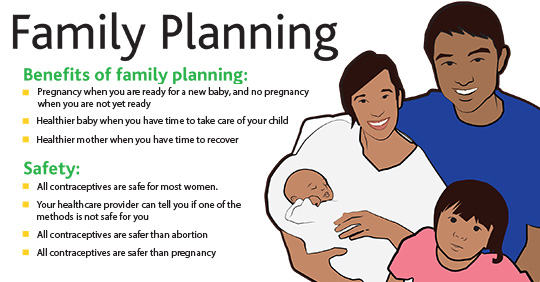Benefits of Family Planning
In this article, we will discuss the numerous benefits of family planning. Family planning refers to the conscious decision made by individuals or couples to control the number of children they have and the intervals between their births. It is an essential aspect of reproductive health and has a positive impact on individuals, families, and society as a whole.
Improved Health and Well-being
Family planning plays a crucial role in improving the health and well-being of individuals and families. By allowing couples to plan and space their pregnancies, family planning methods can help prevent unintended pregnancies, reduce the risk of maternal and infant mortality, and promote healthier pregnancies. It enables women to receive adequate prenatal care, which is essential for their health and the health of their babies.
Economic Benefits
Family planning also brings significant economic benefits. When individuals and couples can plan their families, they can make informed decisions about their education, careers, and financial stability. By spacing out pregnancies, families can better manage their resources and provide a higher quality of life for their children. Moreover, family planning programs have been shown to contribute to economic growth and poverty reduction in communities and countries.
Education and Empowerment
Access to family planning empowers individuals, especially women, to pursue education and achieve their goals. When women have control over their reproductive choices, they can complete their education, participate in the workforce, and contribute to the development of their communities. Educated women tend to have fewer children and are more likely to have healthier families, breaking the cycle of poverty and improving overall societal well-being.
Reduced Pressure on Resources
Family planning helps alleviate the strain on limited resources, such as food, water, and energy. By controlling population growth, family planning contributes to sustainable development and environmental conservation. It allows for better management of resources, reducing the negative impact of overpopulation on the planet.
Improved Gender Equality
Family planning is closely linked to gender equality. When women have access to contraception and can make decisions about their reproductive health, they gain more control over their lives. This control leads to greater gender equality, as women can participate equally in society, pursue their ambitions, and have more control over their bodies and futures.

Family planning offers numerous benefits to individuals, families, and society as a whole. By improving health and well-being, supporting economic development, promoting education and empowerment, reducing pressure on resources, and enhancing gender equality, family planning plays a crucial role in creating a better future for all. It is essential to prioritize access to family planning services and information to ensure a healthier, more sustainable, and equitable world.
Frequently Asked Questions
1. What is family planning?
Family planning refers to the practice of controlling the number of children in a family and the intervals between their births. It involves the use of various methods and techniques to achieve desired fertility outcomes.
2. What are the benefits of family planning?
Family planning offers several benefits, including:
Enabling couples to make informed decisions about the timing and spacing of pregnancies.
Improving maternal and child health outcomes by reducing the risks associated with closely spaced pregnancies.
Empowering women to pursue education, employment, and other opportunities.
Reducing the incidence of unintended pregnancies and unsafe abortions.
Promoting economic stability and poverty reduction.
3. Are there any health benefits associated with family planning?
Yes, family planning has numerous health benefits, such as:
Reducing the risk of maternal mortality and pregnancy-related complications.
Preventing the transmission of sexually transmitted infections (STIs), including HIV.
Allowing women to recover and regain their health between pregnancies.
Improving the overall well-being of mothers and children.
4. Does family planning only involve the use of contraceptives?
No, family planning encompasses a wide range of methods, including:
Contraceptives such as pills, condoms, intrauterine devices (IUDs), and implants.
Sterilization procedures for both men and women.
Fertility awareness methods, where couples track their fertility to prevent or achieve pregnancy.
Emergency contraception.
5. Is family planning only for married couples?
No, family planning is for individuals and couples, regardless of their marital status. It is a personal decision and a basic human right for everyone.
6. Can family planning methods be reversed?
Some family planning methods, such as sterilization, can be reversible in certain cases. However, it’s important to discuss the permanence or reversibility of specific methods with a healthcare provider.
7. Are there any side effects of using family planning methods?
While most family planning methods are safe and effective, some individuals may experience minor side effects. These can include hormonal changes, irregular bleeding, mild discomfort, or temporary infertility after discontinuing certain methods. It’s best to consult a healthcare provider for personalized information.
8. Does family planning promote gender equality?
Yes, family planning plays a crucial role in promoting gender equality. It allows women to have control over their reproductive choices, empowers them to pursue education and careers, and reduces gender disparities in society.
9. Is family planning accessible to everyone?
Efforts are being made to ensure that family planning services are accessible to all individuals. Governments, NGOs, and healthcare providers work together to improve the availability, affordability, and awareness of family planning methods, particularly in underserved communities.
10. Where can I get more information about family planning?
You can gather more information about family planning from reputable sources such as healthcare providers, family planning clinics, government health departments, and organizations like the World Health Organization (WHO) and the United Nations Population Fund (UNFPA).




